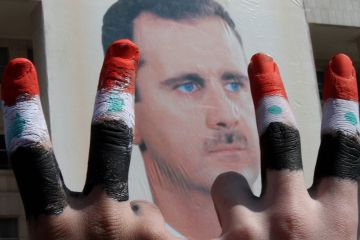 Fadwa al-Hatem writes for The Guardian of London:
Fadwa al-Hatem writes for The Guardian of London:
By blocking internet access for the entire country last Friday, the Syrian regime demonstrated yet again just how out of touch it is with its own people and with the times in general. But the regime is not alone in failing to move with the times. The so-called Syrian opposition in exile – most prominent of which is the Syrian Muslim Brotherhood --- also seems blissfully unaware that things have changed.
At the recent Antalya conference in Turkey, an attempt was made by the various exiled opposition groups to hammer out a unified front and a vision for a post-Assad democratic Syria. Most worryingly, the Brotherhood remained quite staunch in its opposition to a secular future government, and only gave its consent much later in the conference.
Thankfully, events in Syria and the rise of an independent protest movement with roots in the country have shown that the Brotherhood, along with the Assad regime, is increasingly irrelevant to the country's future. Depressingly, such political stupidity as we saw in Antalya will only add fuel for the fire, and will give some force to the ridiculous claims by the regime that fundamentalists plan to turn Syria into an "Islamic emirate".
As a Syrian, I can only watch with despair as a party that has been in exile for almost 40 years – and been portrayed as our bogeyman for just as long – fails utterly in producing anything like a credible opposition. Far from being a bogeyman, it seems more like an exclusive club of doddering old men with no idea what the fuss is all about.
So what on earth have they been doing all this time? The answer, clearly, is not very much. At the Antalya conference, discredited former regime apparatchiks such as Abd al-Halim Khaddam (the former Syrian vice-president) and Rifaat al-Assad (the president's uncle), were fortunately nowhere to be seen. Nor did we see the discredited Farid al-Ghadry, who is a nonentity with the Syrian people.
Yet not long ago, the Syrian Muslim Brotherhood entered into a preposterous political alliance with that same Khaddam after he had exiled himself to Paris and begun to denounce the regime that he had served so faithfully for decades. This alliance was short-lived, but it provided further proof in the minds of many Syrians that the Muslim Brotherhood is a party not to be trusted.
Although I don't trust the Egyptian Muslim Brotherhood either, at least they are organised, politically savvy (to a certain extent) and not known to shoot themselves in the foot. Furthermore, when the Egyptian revolution finally became a reality, they were able to organise and mobilise on an enormous scale, whereas the Syrian revolution appears to have caught both the Assad regime and the Muslim Brotherhood with their pants down – and a good thing too.
Not having a formal, organised, political opposition that can give voice to the protests was initially frustrating and extremely frightening for many Syrians, yet it was also quite liberating. For one thing it has shown that young and old Syrians are capable of taking control of their own destinies without the stale political opportunists and parties of the past.
Young popular committees, deep underground in Syria, are liaising and organising among themselves. They are getting their voice to the outside world at a time when the Syrian regime is forbidding any foreign media from reporting in the country, and they have learned and adapted remarkably quickly. Grainy videos taken with mobile phones now include easily recognisable local landmarks, and the cameraman is careful to always state the date, time and location of the events being filmed. There is even a YouTube channel, Sham SNN, where videos are uploaded almost hourly and, it seems, carefully vetted to avoid hoaxes or irrelevant material being included.
In spite of the brutish and panicked response of the regime and the sluggish reaction of the Syrian "opposition" abroad, Syrian activists are beginning to find their own voice outside of the anachronistic players that have defined Syrian politics for a generation. As that voice gets stronger, the chance of a fresh new vision for Syria becomes ever more likely.